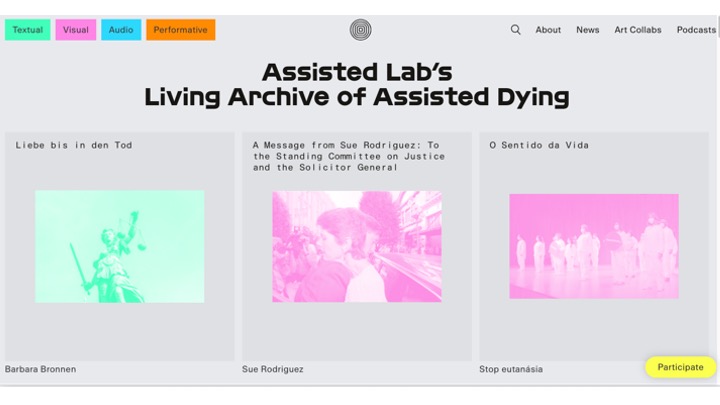
How are the stories we tell about assisted dying used in policymaking and legal decisions?
I currently work as part of the Assisted Lab project at the University of St. Gallen, Switzerland, which tries to understand how and why certain stories about assisted dying are mentioned or used as evidence during the law-making process. Funded by the European Research Council and led by Prof. Dr. Anna Elsner, Assisted Lab is neither for nor against assisted dying. Instead, we want to identify the stories being told during national conversations around legalisation and explore their cultural, political, and legal context, including how different stories are, or are not, cited within parliamentary debates.
In the UK, there is renewed attention to the topic of assisted dying. Popular campaigner Esther Rantzen has spoken about signing up to Dignitas, there is a bill on assisted dying going through the Scottish Parliament, and the issue has recently been debated in the UK Parliament. With an increasing number of countries legalising forms of assisted dying, the likelihood of legalisation in the UK is higher than ever. How the current debates pan out could change end-of-life decision-making for everyone in the UK, including how we die and how we experience the deaths of loved ones.
The role of personal narratives in these debates is not to be underestimated – see, for example, this article about the ‘didactic dying’ of right-to-die campaigners in the British news media. Stories communicate individual situations and emotions in ways that can shift our perspective. Indeed, lawmakers and legal actors regularly cite the impact that stories of assisted dying have had on them and their decisions. Stories are consequently woven into parliamentary debates on assisted dying as evidence both for and against legalisation. The stories we tell about assisted dying through cultural productions like films and books can therefore not only change how people feel about this sensitive issue but also drive legal change.
The Assisted Lab Project
Assisted Lab involves building an online archive of works from across the globe that address assisted dying and the issues around it (https://assistedlab.ch/). The archive comprises individual entries for a range of films, documentaries, books, TV programmes, podcasts and other cultural productions, from Michael Haneke’s Amour to a controversial promo video for a Canadian fashion brand. Each entry has a brief synopsis of the story and an assessment of its message and subsequent impact. We include a list of media articles and reviews of the work to get a sense of how it has been received in its home country and abroad. Importantly, where applicable, each entry also includes links showing how it has been cited and used in parliamentary debates and other legal contexts to show the impact of this story on law-making processes.
The site will eventually give a cross-cultural perspective on different accounts of assisted dying – some ‘for’ and some ‘against’ but many somewhere in-between. We hope the site will grow to be a useful resource for academics interested in finding primary sources to explore the issues surrounding assisted dying. But we also hope that interested members of the public will use the site to find stories that go further than the headlines to explore the issues involved.
Cultural Productions as Legal Evidence

Entries on our website include stories from a wide range of viewpoints and approaches. Some are predominantly advocacy tools, promoting or discouraging access to assisted dying in regions where it is unavailable. For example, Terry Pratchett’s 2011 documentary Choosing to Die provoked debate in parliament about whether the BBC’s impartiality guidelines allowed it to broadcast shows that advocated for legalisation. Other stories are produced after assisted dying has been legalised in a region. Switzerland has allowed assisted dying since the 1940s and Swiss writer Nicola Bardola’s autobiographical novel Schlemm (2005) demonstrates the complexities of a son’s reaction to his parents’ decision to end their lives together.
Some of the works we feature have had a particularly significant impact on the national conversation around legalisation with frequent citation in parliamentary debates, evidence to government inquiries and subcommittees, and in surrounding media coverage of the issue. French author Anne Bert’s book Le tout dernier été (The Very Last Summer, 2017) was part of her process of becoming a prominent activist for assisted dying following her diagnosis of motor neurone disease (also known as ALS). The book, which followed Bert’s open letter to the French President, documents her suffering and explains her decision to travel to Belgium where assisted dying was already legal. It was cited verbatim in parliament as part of debates on what was colloquially known as ‘Anne Bert’s law’ and even led to Bert contributing to a later assisted dying bill that was discussed (after her death) by the Assemblée nationale.
Bert’s case and her book continue to be touchstones of the debate in France today. Other works haven’t been cited so frequently but seem topical and relevant to the debate, such as How to Die: Simon’s Choice, a BBC documentary from 2016. We’re interested in why that might be and so we include these on our website too. Sometimes a lack of attention is only because works are too recent. It seems likely, for example, that Mayflies, the 2022 BBC adaptation of Andrew O’Hagan’s novel of the same name, will feature in Scottish conversations as Holyrood continues to debate the issue in the future.
Stories and Grey Areas
We are also interested in the ways in which certain stories are interpreted and used in legal debates. For example, the Spanish film Mar Adentro (The Sea Inside, 2004) recreates the story of real-life campaigner Ramón Sampedro (played by Javier Bardem) who became quadriplegic after a diving accident. Decades later Sampedro ended his life with the help of a group of friends each of whom played a small enough role in assisting his death that they could not be implicated legally. The film was seen as a powerful plea in favour of legalising assisted dying and was influential in both public and parliamentary discourse on the subject that led to euthanasia being legalised in Spain in 2021.
However, while the film has often been viewed as a right-to-die story, it is far from black-and-white in the way it depicts the impact of assisted dying. Notably, Ramón’s sister-in-law and main carer Manuela Sampedro (played by Mabel Rivera) never fully accepts his decision. This raises questions about how stories are used in law-making processes around complex issues.
Unlike the law which seeks a clear line between right and wrong, many of the works we’ve examined go beyond pressure group slogans to show the complexity of the reasoning and emotions behind someone’s wish to die and its impact on family, friends and medical professionals. However, stories cited in legal debates are never reproduced in their entirety and so, despite their variety and nuance, this source material can be end up being simplified to make a particular point or accepted as evidence without reflection. The Assisted Lab project believes examining these stories in their complexity can restore nuance into the debate and show us more clearly what is at stake.
Conclusion: Participate
We have plenty of entries in the pipeline but we’d love to hear from you about films, documentaries and books that deal with the topic in some way. In the bottom right-hand corner of our website, we have a ‘participate’ button which you can use to suggest a story or piece that is relevant to the archive. New cultural products are coming out all the time and may have significance in how we understand or deal with assisted dying in the future, whether culturally or legally. We are also not limiting ourselves to ‘traditional’ formats so please do recommend podcasts, Tiktok videos or blog posts – anything that’s part of the conversation.
__________________________________________
Bio
The Assisted Lab project is an international research programme at the University of St Gallen, Switzerland funded by the European Research Council and involving researchers from Switzerland, Canada, the Netherlands and the UK. It is led by Anna Elsner, Associate Professor of Medical Humanities at St. Gallen, and Senior Investigator Vanessa Rampton based at McGill University, Canada. For more details, see assistedlab.ch.
Joe Wood is a Visiting Fellow at the University of St Gallen and has previously worked at King’s College London. He has a PhD from the University of Glasgow and his first monograph, Cicely Saunders and Total Pain: Holism, Narrative and Silence at the End of Life, is published by Edinburgh University Press in November 2024.

